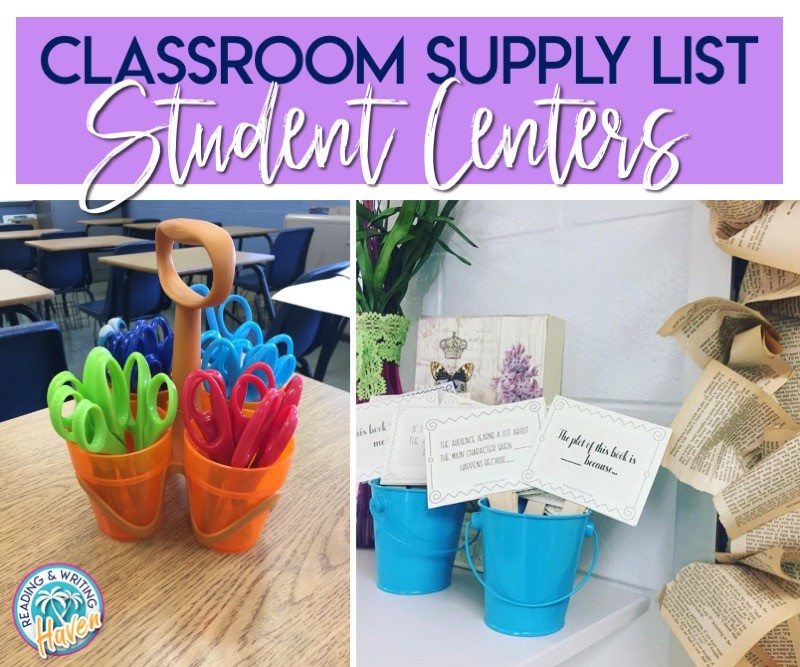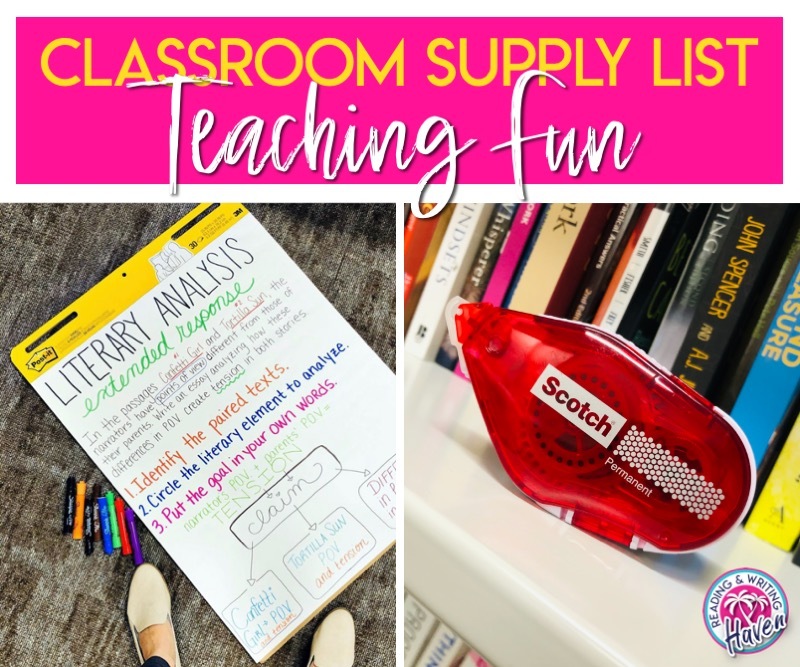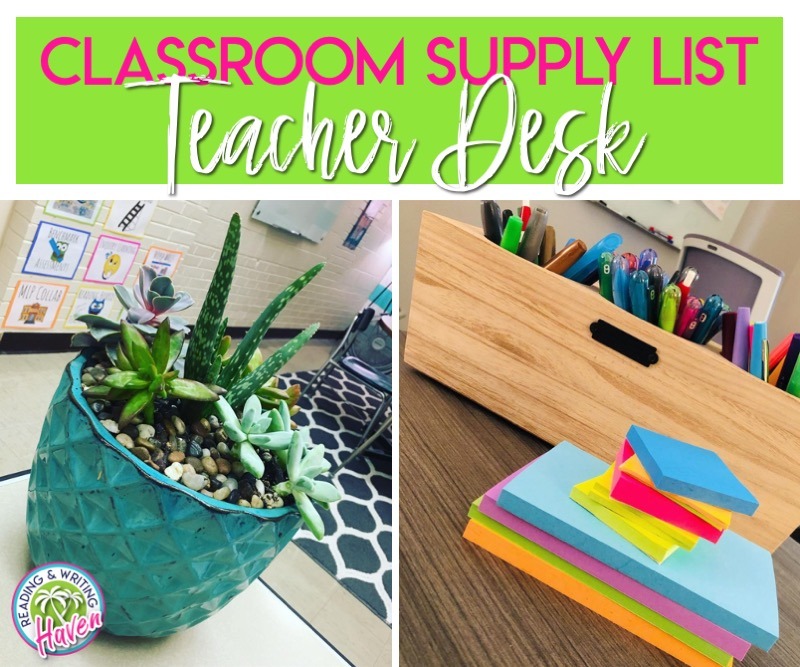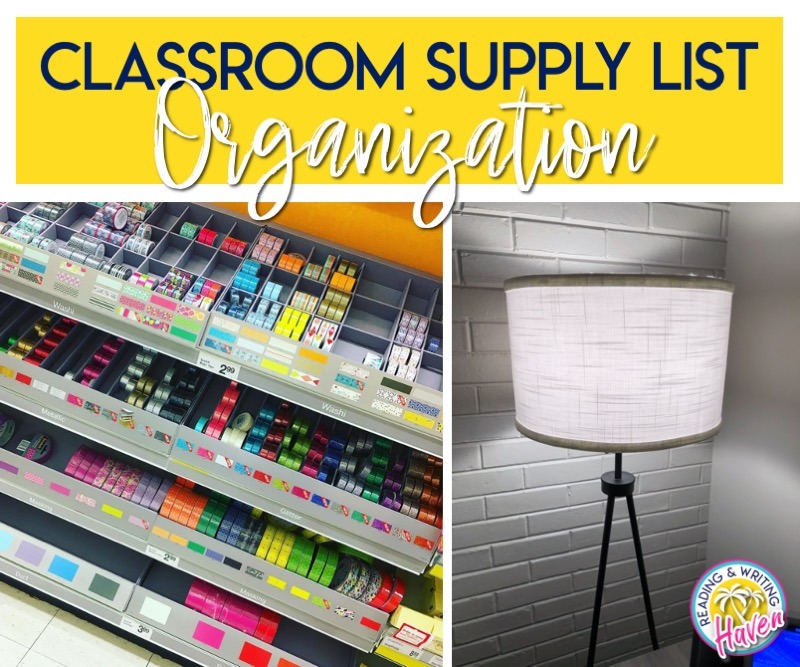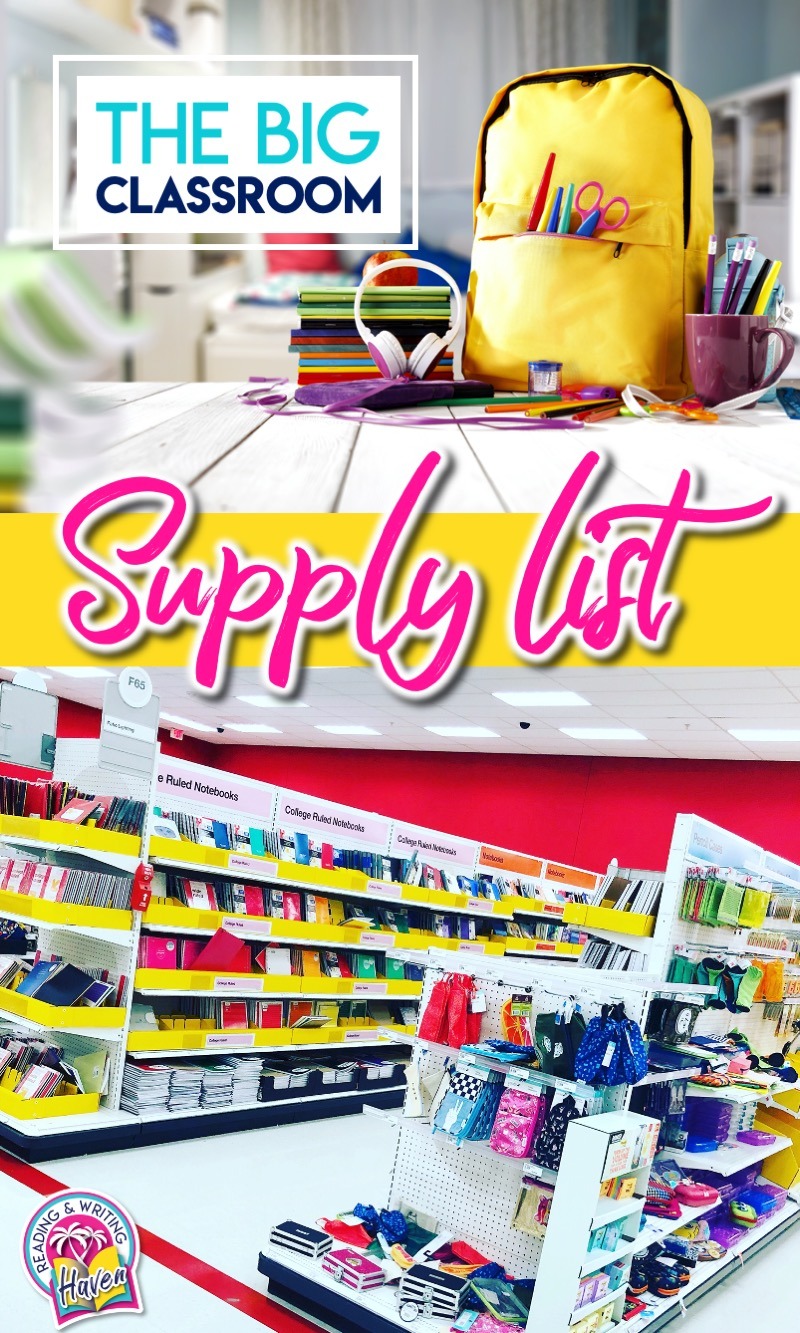The Big Classroom Supply List for Teachers
Trying to fill out that silly classroom supply list request form? Teachers in many schools are asked to complete one every year, but – for many reasons – these forms are confusing! Whether it’s a limited budget or uncertainty about what we really need, we often question our choices.
In this post, you’ll find some suggestions to help you brainstorm. The items included on this supply list are things I’ve collected over many years. If you’re teaching in a building with a limited budget, I get it! Most years, my cap for classroom supply requests has been 50 dollars. It doesn’t go that far. And, many teachers aren’t even given that much.
I certainly don’t recommend trying to purchase all of these items in one year. Hopefully this list will just provide some ideas and help you to prioritize what you want or need most…with the ultimate goal of making the classroom supply list request form less overwhelming.
The items you’ll find in this classroom supply list are ones that will help to make teaching and learning fun!
CLASSROOM SUPPLY LIST BY CATEGORY
Student Centers
I like to think of my classroom supply list in terms of categories. One of them is student centers. These are supplies I want students to be able to access without having to ask permission. At the beginning of the year, I teach them where they can find supplies, how to treat them, and procedures for cleaning them up. Even older students benefit from these explicit routines.
Paper – I like to have a combination of stationary (to make notetaking fun), notebook paper, and cardstock (for projects). Since it’s expensive, I usually collect stationary from family members who clean out drawers at home or from retiring teachers.
Kleenex – Students go through them like crazy, but I don’t offer extra credit for Kleenex. It’s just not fair, and it distorts the grade.
Scissors – Nothing slows workflow down like having to wait for 30 students to share 2 pair of scissors. I like to keep scissor caddies on hand so that we can be more efficient when cutting up task cards or manipulatives.
Tape (and dispenser) – My first year teaching, I ordered tape on my classroom supply list (the little rolls). But? I forgot the dispenser! A good dispenser will last you a lifetime, unless you get bored with the style or color. Then, of course, you could do with another. I like to keep one on my desk and one available for students.
Art supplies – If you have students make name tents or color-code their notes, writing, or vocabulary activities, you’ll want some art supplies on hand. I like markers because when students are working on sketch notes, one pagers, or other similar assignments, they love having a selection of markers to choose from. Crayons (the skin tones ones are a favorite) and colored pencils are also handy. Students love Mr. Sketch!
Pens, pencils, and highlighters – I let my students borrow them. I’ve tried ALL the tricks. Some strategies slow down the process of pencils going missing, but mainly, I just want my students to be able to write when they need to. Don’t forget highlighters for close reading!
Composition books – I’ve used composition books for interactive notebooks and reading / writing notebooks. They’re convenient to store because there are no spirals to tangle.
Folders – Keep student centers organized with extra copies of handouts, reference sheets, or reading and writing conference forms. Folders can also be a great way to organize learning station activities.
Tongue depressors – Tongue depressors are wonderful for creating quick formative checks. Even something as simple as putting yes/no or green/red on opposite sides of the depressor can give you an efficient way to formatively check understanding during a whole-class activity or lesson. I also love using them to hold literature grab and gab cards. With extra time for small groups or at the end of class, you can pull them out and have students talk about a whole-class text or independent reading book.
Sanitizing wipes & hand sanitizer – These are #musthaves. Like several of the items in this post, I don’t think teachers should have to purchase them out of pocket. Ask if your building supplies wipes and hand sanitizer before spending any money. If they don’t, I would prioritize finding some. Definitely train your students how often and when to use sanitizing wipes and hand sanitizer so they are not wasted. Before sitting down in their desk at the beginning of the period? Wipe down desks and tables at the end? Build cleanliness into your routines.
Teaching Fun
These are items that are often pricier, but if you are able to get your hands on them, they can add some enjoyment to your days in the classroom.
Anchor chart paper – Even middle and high school teachers can use anchor charts. It makes thinking visible and provides a way to tie mini lessons to group and independent practice. I use large Post-It easel pads because they are extra sticky and convenient to display. Put them on your classroom wall, or hang them with a clothesline to naturally spiral in previously learned concepts.
Flip chart markers – Sharpie flip chart bullet tip markers are my favorite for creating anchor charts. They write smoothly and never seem to run out of ink.
Expo markers – If your classroom has a dry erase board, don’t forget to stock up on colorful Expo markers. You can use them to color code assignments for different preps or to visually categorize notes and ideas for students.
Mini dry erase boards – Mini dry erase boards are a fun way to get every student involved in activities. I ask students to hold them up as a formative check or review, but you can also use them for language practice with vocabulary and grammar stations.
Microphone – An ultimate luxury, a wireless microphone is just a fun way to jazz up any type of presentation. Use it to spice up your lessons, to alleviate public speaking anxiety, or to interview a character from a story. You can also connect to your favorite playlist on YouTube, Spotify, or Pandora.
Double-sided adhesive roller – This may be the absolute favorite item on my classroom supply list. I use these rollers all the time to make word wall content, posters, and student work stand out – just add a cardstock backing. Plus, you can use the double-sided adhesive roller to attach cardstock to task cards before laminating. I’ve also used it to put together classroom bulletin boards.
Cardstock – I use cardstock ALL. THE. TIME. As mentioned above, it’s perfect for bulletin boards, word walls, and displaying student work. My students also use them to create “about me” bookmarks at the beginning of the year.
Task card boxes – Task card boxes make it easy to stay organized. This kit not only helps keep task cards together, but also helps to organize all task cards in the same place! Plus, it’s cute. (I also use these storage containers for my family photos at home. Some day, I hope to give each kid a box full of memories.)
Dice – I love to incorporate review games in my classroom. I used to have to borrow dice, but once I realized my dice games were a yearly activity, I decided I needed to order a dice set for my own classroom.
Teacher Desk
Whether you have a physical teacher desk, just a table in a corner, or a rolling cart, these are the relevant items you could include on a classroom supply list.
To-Do List Notepad – Do you love to-do lists? I do! Especially when I get to cross things off! This is a fun little notepad to have on your desk so that you can write down all thing things in your brain and still focus on the current task at hand.
Flair pens – Nothing makes me smile like a cup full of flair pens sitting right on top of my desk! I like the PaperMate brand, but I’ve heard that the Amazon Basics are just as good.
Post its – I stick large Post-It notes inside my file folders (yes, I still organize both digitally and with paper) to keep running notes to myself. (Ex. – Next year, only use an excerpt from “The Veldt” to teach conflict). And, I keep the smaller ones on hand for reading strategy work, annotating, and sticky note reviews.
Pen organizer – I’ve gone the route of keeping all my pens organized IN my desk before, but then I have to open a drawer every time I want to use one, and I can’t admire them! Pen organizers with dividers are the best for organizing heights, colors, or styles. This rotating caddy from Michaels is fun…or try this one from Amazon.
Stapler – It’s a staple! (and, don’t forget the staples, too) That’s all.
Paper clips – Handy for all sorts of things! Students usually ask to borrow them, so I order enough to share. Having different colors on hand helps me to keep piles of papers organized.
Binder clips – One of my go-to ways for organizing extra copies, binder clips are a necessity. You can also get the magnetic ones to hang no-name papers or to provide a convenient location on the white board where students can borrow and sign out pencils.
Command strips – When I can’t get things to hang on cement block walls, I’ll often use indoor Command mounting squares. They work better than anything I’ve found.
Plant – A little greenery goes a long way. While I wouldn’t order a plant on my school supply budget, it is an item I try to remember every year (except when I’m in a windowless classroom….apparently even hens and chicks need more than fluorescent lighting!).
Family Photo – Another item I don’t order from a school supply store, but one that makes me happy to look at all year long.
Classroom Organization
When I think of a classroom supply list, I think about getting organized. How can I use the budget I’m allotted to be more efficient with my time?
Metal rolling cart – Metal rolling carts are the perfect complement to a teacher’s desk. You can keep pretty much anything you need on them (like washi tape, art supplies, and books).
Washi tape – Washi tape is fun for decorating the cover of a reader’s or writer’s notebook. You can also apply it to the floor to function as a plot diagram or to help students understand a concept like iambic pentameter. Stick it to the board to create a table for organizing assignments and agenda items by class!
Lamp – Florescent lighting gives me a headache, which I think is pretty common. I don’t like to have all of my classroom lights on all day, so lamps are an important way I set the mood during independent reading or writing time. They create a calming effect, which helps me to organize my thoughts! I like three-way floor lamps like this one for reading nooks. They provide more light for calm, florescent off situations. Avoid glass shades in case of an accident! I also like a desk lamp like this so that I can turn my lights down during prep periods and still be productive.
Supply Caddies – If you like to have students work in groups, supply caddies are an efficient way to organize materials they will need so they can sit down and get right to work. Fill them with sticky notes, highlighters, markers, and other close reading tools…or learning station activities.
Magnets – Display student work, no-name papers, or reminders on your white board or chalk board using magnets. I also use them to attach classroom and family photos to filing or double-door cabinets. Magnets are just handy to have on hand in general.
Tablet charging station – I love having a charging station for devices. It keeps them from taking up too much space, and it also reduces the number of students who cannot complete work because their device is dead.
Device storage – Some teachers prefer to have students store their devices until it’s time to use them. If your classroom policy is such, it can be annoying to have devices laying on the floor because then everyone has to tip toe around the room, dodging them. This device keeper is not the prettiest one around, but you can’t beat it for the price. Here’s one that’s a bit sturdier…but also more costly.
Milk crates – By far, one of the easiest ways I’ve found to stay organized is with milk crates! I use one solid-bottom crate for each prep (which means I have 2-3 crates sitting behind my desk, typically). In each crate, I place one hanging file folder (with a manilla file folder inside of it so I can label) for EACH unit I teach. The only thing that goes in that manilla folder is ONE hard copy of each assignment, the answer keys, and a post-it note with reminders for the next year.) This system makes it incredibly simple to stay organized.
Document cameras – If you like to model reading strategies for students or share a mentor text or read aloud, document cameras are essential. They help to make thinking visible.
I hope this big classroom supply list helps you to decide what to do with your budget, if you’re privileged to have one. Surely, I’ve forgotten some things.
I will say that most of the years I’ve taught, I spend more of my own money on classroom supplies than what the school will cover. And, no one should feel obligated to do that! I just love having fun supplies and don’t mind sacrificing a few new pieces of my teacher wardrobe for them.
And, of course, it’s important to remember that while fun, classroom supplies aren’t nearly as important as the love we have for our students, the memories we make, and the relationships we build with them.
Disclosure: This post contains affiliate links. As an Amazon associate, I may earn commissions from qualifying purchases from Amazon.com at no expense to you.

